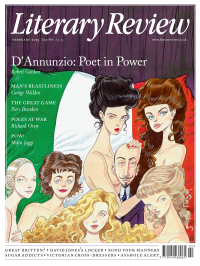Peter Marshall
Come All Ye Faithful
Trent: What Happened at the Council
By John W O’Malley
Harvard University Press/Belknap Press 335pp £20
Stop people in the street, even a street in Oxford or St Andrews, and ask them to name a significant historical event we should commemorate in 2013: odds are you won’t hear about the 450th anniversary of the conclusion of the Council of Trent. Yet a fair number of our hypothetical victims will probably have heard of Trent, and many of those will have a view about its meaning and significance. Trent, they might say, inaugurated the Counter-Reformation, battening down the hatches on the closed, authoritarian and oppressive mind-set from which the Roman Catholic Church only (partially) managed to escape during the Second Vatican Council beginning in 1962 (coincidentally, last year’s forgotten anniversary). An alternative version, popular among some contemporary conservative Catholics, is that Trent eloquently codified the eternal truths that Vatican II proceeded carelessly to dilute. The current official line in Rome is that Catholic faith and morals, from the one council to the other and beyond, are to be interpreted through a ‘hermeneutic of continuity’; the world changes, the Church does not.
The very considerable achievement of John O’Malley, an immensely learned American Jesuit and academic, is twofold: he strips away these accumulated layers of myth to provide a balanced and convincing account of the Council in its proper historical context; and, more impressively still, he manages to conjure a compelling narrative

Sign Up to our newsletter
Receive free articles, highlights from the archive, news, details of prizes, and much more.@Lit_Review
Follow Literary Review on Twitter
Twitter Feed
Under its longest-serving editor, Graydon Carter, Vanity Fair was that rare thing – a New York society magazine that published serious journalism.
@PeterPeteryork looks at what Carter got right.
Peter York - Deluxe Editions
Peter York: Deluxe Editions - When the Going Was Good: An Editor’s Adventures During the Last Golden Age of Magazines by Graydon Carter
literaryreview.co.uk
Henry James returned to America in 1904 with three objectives: to see his brother William, to deliver a series of lectures on Balzac, and to gather material for a pair of books about modern America.
Peter Rose follows James out west.
Peter Rose - The Restless Analyst
Peter Rose: The Restless Analyst - Henry James Comes Home: Rediscovering America in the Gilded Age by Peter Brooks...
literaryreview.co.uk
Vladimir Putin served his apprenticeship in the KGB toward the end of the Cold War, a period during which Western societies were infiltrated by so-called 'illegals'.
Piers Brendon examines how the culture of Soviet spycraft shaped his thinking.
Piers Brendon - Tinker, Tailor, Sleeper, Troll
Piers Brendon: Tinker, Tailor, Sleeper, Troll - The Illegals: Russia’s Most Audacious Spies and the Plot to Infiltrate the West by Shaun Walker
literaryreview.co.uk